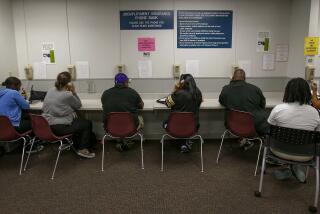Labor Costs Jump 4.2% in 2nd Quarter
- Share via
U.S. labor costs rose by the most in almost five years and productivity growth slowed in the second quarter, suggesting that the Federal Reserve will resist calls from Congress to stop raising interest rates.
The cost to companies of employing workers was 4.2% higher in the second quarter than in the year-earlier period, the Labor Department said Wednesday. Productivity, a measure of how much an employee produces for every hour worked, rose at a revised 1.8% annual rate from April through June, the slowest in nine months, after a 3.2% increase.
In the six weeks before Katrina struck, economic growth was “widespread,” led by car sales and tourism, even as the housing boom cooled and energy costs soared, the Federal Reserve said in a second report.
Most of the 12 Fed districts reported increased growth, according to the survey of regional economies known as the “beige book,” for the color of its cover. The survey reflects information collected from mid-July until Aug. 29.
The San Francisco bank said the region that includes California expanded at a solid pace, while retailers reported “solid demand.”
The Labor Department said the average increase in U.S. labor costs over the last four quarters was 4.3%, more than double the 2% average of the record 10-year expansion that ended in March 2001.
Labor costs rose at a 2.5% annual rate during the quarter compared with the previous three months, the most since the end of last year.
The Labor Department’s measure of nonfarm business output increased at a 4.1% annual rate in the second quarter after a 4.3% pace in the prior three months. At the same time, the index of the number of hours worked increased at a 2.2% pace in the second quarter, twice as fast as in the first three months.
To keep inflation from accelerating, Fed policymakers have raised interest rates 10 times since June of last year. Last month, they boosted their benchmark overnight bank lending rate a quarter of a percentage point to 3.5%.
Some economists, including those at Goldman Sachs, Merrill Lynch and UBS Securities, predict the Fed may pause at its meeting Sept. 20 because of the potential disruption to growth from Hurricane Katrina. Goldman Sachs lowered its third-quarter growth forecast to 3.5% from 5%.
More to Read
Inside the business of entertainment
The Wide Shot brings you news, analysis and insights on everything from streaming wars to production — and what it all means for the future.
You may occasionally receive promotional content from the Los Angeles Times.










